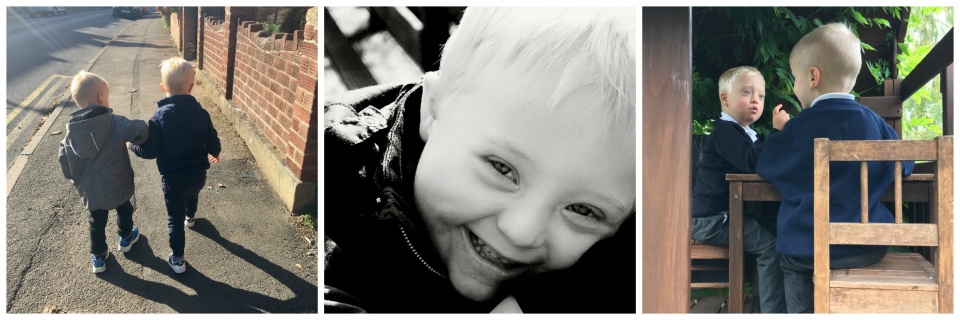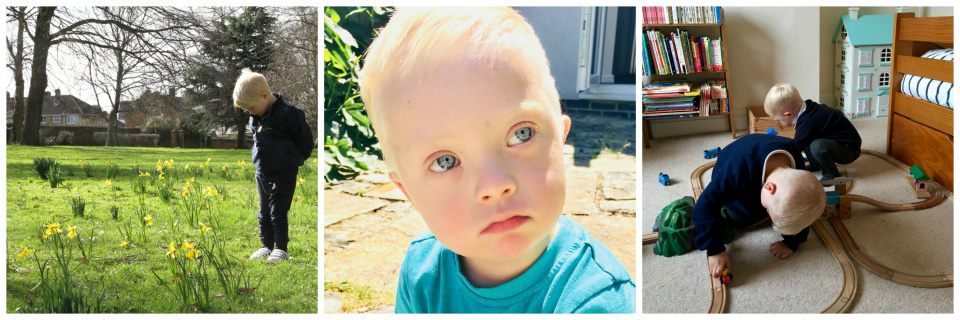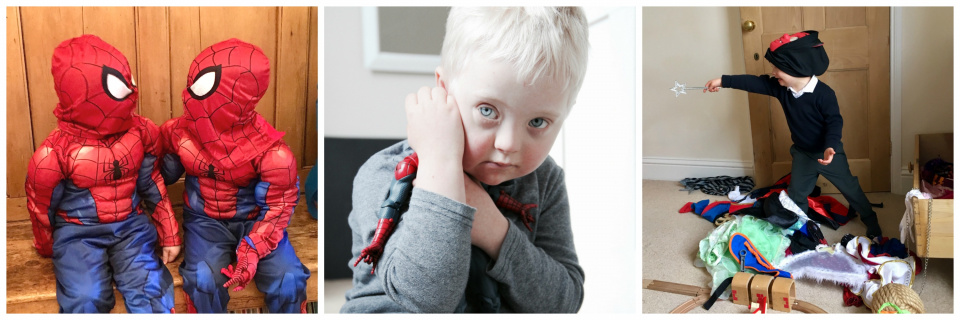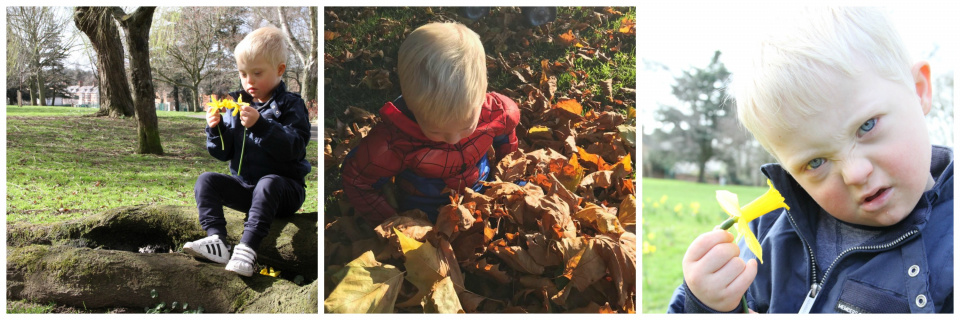Maxwell was born on World Down Syndrome Day 2014. Now as he turns five on March 21, his mum Molly tells us about Maxwell starting school and his journey into the next stage of his life.
As this year’s WDSD theme is #LeaveNoOneBehind, Molly particularly talks about how Maxwell’s school makes sure every single student has the same opportunities, so that nobody is left behind.

This year Maxwell started school. What an immensely daunting transition for any child, let alone one with complex additional needs. It’s been hard not to compare his experience with that of his sister; same school, same parents and mostly the same teachers. I was concerned about him entering the world of academic targets and school reports. How would he cope in a mainstream setting with such a developmental and cognitive disadvantage? As always though, he has made it absolutely his own unique journey.
He did start off with one huge advantage, he moved up at the same time as his key worker from nursery – they started their first day together, and what a pair! It’s been so wonderful watching them both settle in to a new routine and grow in confidence, delighting in showing everyone at ‘big school’ what Maxwell is capable of. The school community have been brilliant at welcoming us all and they have embraced his little quirks without question. He has adapted meals and differentiated resources but pretty much joins in with school life in the same way as his peers.

His peers are amazing and they all adore him. Not just those in his class, children line up outside his classroom waiting to play with him at break time, he’s become quite the celebrity. We can’t go anywhere within the community without someone, child or adult, saying “hello Maxwell”, “look it’s Maxwell” or simply taking his hand to play. Everyone is learning how to communicate with him and each week in the school newsletter there’s a new Makaton sign to master. The nativity play this year made me particularly teary eyed, not because he looked too cute (which they all did), but because all the children signed along to every song so Maxwell was truly included.
I was anxious that when Maxwell started school he would be treated differently and left behind, but as always I shouldn’t have worried. I should know by now to see the world from his perspective and not my own. In fact it’s now not just my perspective, Maxwell is a beloved member of his community and when I don’t know what to do to make it better, others step in and do it for me as they care for him just as much as we do. Even the kids carry on cajoling and encouraging him long after I’ve given up.
I also feared how other parents would feel about having Maxwell in their child’s class but again I hadn’t appreciated it from their perspective. When one mum said to me that she was so thrilled that Maxwell was in her child’s class, I asked her why and she simply said ‘because he’s teaching him everything I want my son to learn’. I mean wow, you can’t ask for more than that.

Maxwell is also learning so much from his peers – mostly about guns, swords and play fighting, oh and having a meltdown to get his own way! Like his friends, he is completely obsessed with superheroes, especially Spider-Man who literally goes everywhere Maxwell goes, even to school in the morning. He is learning about sharing, team work and compromise, he’s learning to be a good friend and that his opinion matters just as much as the next persons. Hopefully he will also learn that he cannot always get his own way! Mind you he still has that infectious laugh and beguiling smile so it may be a while yet…
On reflection, I guess it depends on what we measure success by and what we mean by being left behind. Maxwell’s first school report came home last month. Not surprisingly he is below the national average for most areas of learning and development. However, he is on target for personal, social and emotional development (making relationships), he is ‘a friendly member of the class and others choose to work with him’. So, yes he may well be left behind in terms of academic success but in terms of teaching others kindness, acceptance and tolerance, he is absolutely leading the way. He is a wonderfully generous, caring and empathetic child with an incredible sense of fun and a cheeky smile. He shows everyone he meets about the importance of inclusion and demonstrates that we all have a positive contribution to make to our community, we just need an opportunity to explore what that might be.

What can schools do to ensure they #LeaveNoOneBehind?
Maxwell attends Naunton Park Primary School. Two of the children there have Down’s syndrome, so we asked the school how they make sure each and every student is nurtured and developed.
How do you make sure you accommodate for any additional needs children with Down’s syndrome may have?
- Taking time, sharing ideas and knowledge.
- Planning and sharing that planning with the whole team.
- Manipulating plans / activities to ensure they are routine in their layout and very visual.
- Have support staff that have worked 1:1 with children who have Down’s syndrome previously.
- Having regular (termly) TAC meetings with parents and SENDCO.
- Liaising with other agencies to get the best outcomes for pupils with Down’s syndrome. For example, speech and language and an advisory teaching service.
Is there any particular learning/teaching techniques that you have found help Maxwell, or other children with Down’s syndrome in the classroom?
- Ensuring that activities are routine and visual in their layout.
- Making sure that language is consistent – what you say, how many words are used and what it means.
- Using signing to support images and language used. Using and supporting ideas with visuals. Making sure there are periods of quiet, where small voices can be heard.
How does the school ensure that they ‘Leave No-One Behind’ and that all children feel included and a part of the community?
- Teachers, SENDCO and senior leaders meet termly through ‘Pupil Progress’ meetings to discuss children with specific needs and any child that they have concerns about falling behind.
- Following the discussion, interventions are put into place to make sure all children make good progress.
- Sometimes these interventions can be outside agencies that have the specialism to support specific needs, such as children with Down’s syndrome.
If you could give some advice to a school who is about to welcome its first students with Down’s syndrome, what would it be?
- Open communication with the parents, they are the experts about their child.
- Don’t be afraid to ask other professionals for advice and guidance when looking at interventions and teaching styles that will support the child.
- Staff training and time to plan appropriately so every child meets the curriculum at their own level.
- Be inclusive and positive with all children.
- Celebrate all of the child’s achievements however small or large, as they can feel that they can’t do things often before they have tried.
The Down’s Syndrome Association have created some resources for schools that can be used in a class or assembly. There are presentations and documents for children and young people with information about Down’s syndrome. Please call the DSA Helpline if you have any questions about how to use the resources or would like to know more about our education and development training.
